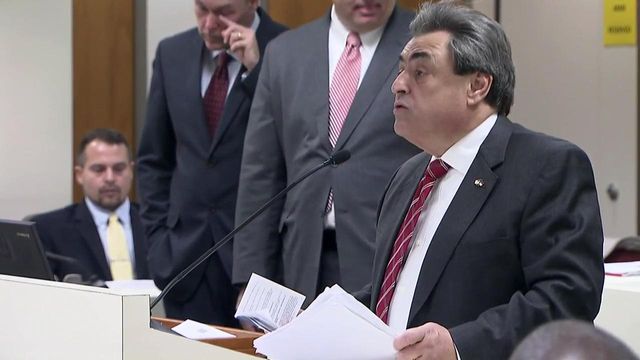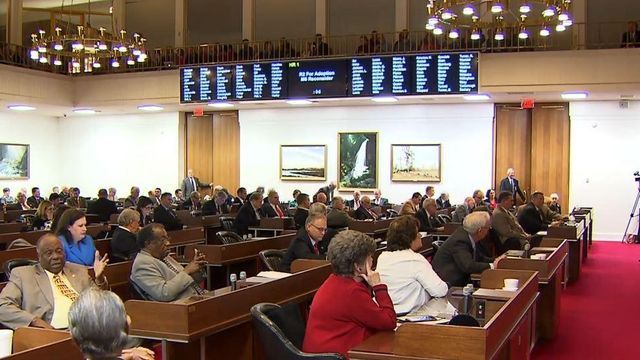Senate readies elections, ethics overhaul
A new bill would merge the state ethics and elections boards and evenly divide it between Republicans and Democrats. Critics say rules in the bill would hobble the board responsible for overseeing elections, campaign finance and ethics laws.
Posted — UpdatedThe bill would roll the state's Board of Elections, Ethics Commission and a division of the Secretary of State's Office that oversees compliance with lobbying laws into a single independent agency. Although that's not a controversial idea by itself, the specific rules that would govern the agency have critics raising questions about partisan intent and whether it will be able to effectively administer the laws it is charged with overseeing.
The new State Board of Elections and Ethics Enforcement would be run by an eight-member board split evenly between Republicans and Democrats. The bill would also change how cases make their way through the appellate courts, alter appointments to the state Industrial Commission and make appellate court elections partisan.
This is not the first time that lawmakers have sought such a merger. A similar merger was proposed in 2013 but never passed. At the time, lawmakers argued it would be more efficient to put all agencies that deal with public trust issues under one roof. Because the new oversight board will be evenly split, backers say it will avoid the appearance of partisan entanglements.
"This group will be a nonpartisan committee because it will be completely balanced," said Sen. Bob Rucho, R-Mecklenburg.
Under rules set up in the bill, the board would need six votes to exercise most of its oversight powers, including issuing subpoenas or calling new elections.
"The biggest problem with the Board of Elections rewrite proposal is the requirement to have six votes of an eight-member bipartisan board to take substantive action," said Mark Ezzell, a Democratic member of the Wake County Board of Elections. "This will turn the State Board of Elections into a toothless tiger, much like the Federal Elections Commission."
The bill is complex and contains a number of other provisions. They include:
- State Supreme Court and Court of Appeals races would be partisan under this bill. Currently, judges for appellate courts run in nonpartisan contests. Under those nonpartisan rules, Republican Supreme Court Justice Bob Edmunds lost his seat this year to Superior Court Judge Mike Morgan, a Democrat.
- The current five-member State Board of Elections would be dismissed and replaced with the sitting members of the state Ethics Commission. They would remain in place until this summer, when a new board would be appointed. The state board was forced to handle a number of unforeseen events sparked by federal court rulings. During the year, it ignored urging from Republican Party officials to limit early voting hours and refused to countenance a number of voting fraud cases brought by the state GOP.
- Of the eight-member board, half would be appointed by the governor. The remainder would be appointed by the legislative leadership.
- The new board would alternate the chairmanship between Republicans and Democrats. Republicans would chair the board during even-numbered election years, while Democrats would have that job in off-years.
- Local boards of elections, which are currently three-member panels, would become four-member boards evenly split between Republicans and Democrats. As with the state board, local boards would alternate the chairmanship. Due to how the chairs alternate, Republicans would head the boards of the state's largest counties, such as Wake and Mecklenburg, in even-numbered years, when partisan elections take place.
- The bill restricts the new state board from playing any role in drawing new voting districts. At one point this year, a federal judge contemplated requiring the State Board of Elections to draw new maps for Wake County.
- The ability to appeal certain cases to the state Supreme Court would be limited under the bill. Instead, some cases would have to first be heard en banc by all 15 Court of Appeals judges before heading to the Supreme Court. This would, in effect, slow the progress of a case to the state's highest court.
- The bill effectively extends the term of Bill Daughtridge, McCrory's former secretary of administration, on the Industrial Commission by six years. It would also allow McCrory to appoint the chairman of the commission, who would serve over the next four years.
Related Topics
• Credits
Copyright 2024 by Capitol Broadcasting Company. All rights reserved. This material may not be published, broadcast, rewritten or redistributed.






